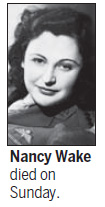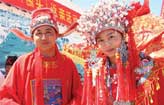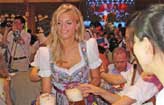Society
French resistance hero Nancy Wake dies at 98
Updated: 2011-08-09 07:46
By Rod Mcguirk (China Daily)

CANBERRA, Australia - Australian Nancy Wake, who as a spy became one the Allies' most decorated servicewomen for her role in the French resistance during World War II, has died in London, officials said on Monday. She was 98.
Code named "The White Mouse" by the Gestapo during the war, Wake died on Sunday in a London nursing home, Prime Minister Julia Gillard said.
"Nancy Wake was a woman of exceptional courage and resourcefulness whose daring exploits saved the lives of hundreds of Allied personnel and helped bring the Nazi occupation of France to an end," Gillard said in a statement.
Trained by British intelligence in espionage and sabotage, Wake helped to arm and lead 7,000 resistance fighters in weakening German defenses before the D-Day invasion in the last months of the war.
While distributing weapons, money and code books in Nazi-occupied France, she evaded capture many times and reached the top of the Gestapo's wanted list, according to her biographer, Peter FitzSimons.
"They called her the 'la Souris Blanche', 'the White Mouse', because every time they had her concerned ... she was gone again," FitzSimons told Australian Broadcast Corp radio on Monday.
"Part of it was she was a gorgeous looking woman," he said. "The Germans were looking for someone who looked like them: aggressive, a man with guns - and she was not like that."
France decorated her with its highest military honor, the Legion d'Honneur, as well as three Croix de Guerre and the Medaille de la Resistance.
The United States awarded her its Medal of Freedom and Britain, the George Medal. Her only Australian honor did not come until 2004, when she was made a Companion of the Order of Australia.
Born on Aug 30, 1912, in the New Zealand capital of Wellington, she was the youngest of six siblings. When she was 2, the family moved to Sydney, but her father left the family soon after and returned to New Zealand.
Wake became a nurse before an inheritance from a New Zealand aunt enabled her to run away from home in 1931 and fulfill her dream of traveling to New York, London and Paris, she said in an interview with the Australian Broadcasting Corp in 1985.
After studying journalism in London, she became a correspondent for The Chicago Tribune in Paris and reported on the rise of Adolf Hitler in Germany. A 1933 trip to interview Hitler in Vienna led her to become committed to bringing down the Nazis.
"I saw the disagreeable things that he was doing to people, first of all the Jews," she told Australian Broadcasting Corp radio in 1985. "I thought it was quite revolting."
When World War II broke out in 1939, she was living in the French city of Marseille with her first husband, French industrialist Henri Fiocca. She helped British servicemen and Jews escape the German occupying force.
Her husband was eventually seized, tortured and killed by the Gestapo. But Wake managed to escape in 1943 through Spain to London.
Associated Press
E-paper

My Chinese Valentine
Local businesses are cashing in on a traditional love story involving a cow herder and a goddess
Outdoor success
Lifting the veil
Allure of mystery
Specials

Sowing the seeds of doubt
The presence in China of multinationals such as Monsanto and Pioneer is sparking controversy

Lifting the veil
Beijing's Palace Museum, also known as the Forbidden City, is steeped in history, dreams and tears, which are perfectly reflected in design.

Beer we go
Early numbers not so robust for Beijing's first international beer festival
